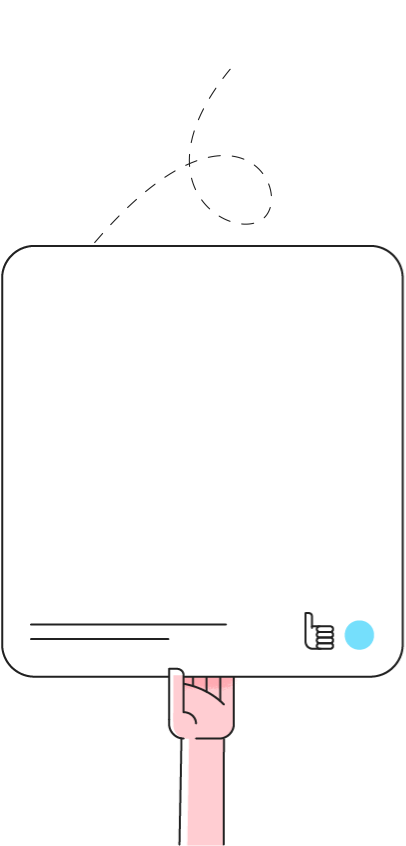Table of Contents
Most people coming into the influencer scene will not have any experience negotiating with brands. This gives brands greater leverage to get more content out of you with less pay. Learning how to negotiate with brands as an influencer will teach you how to navigate the seemingly complex brand negotiations with ease.
Understand Your Value
Before you can even start the negotiation process with the brand, you need to take an account of how much you’re worth. You might think that brands look at just follower count, but that’s not true. There are other ways to show brands that you can bring them value as an influencer, specifically engagement rates and audience trust:
- Overall engagement rate = (Average Likes + Comments + Saves + Shares)/followers
- Engagement rate per post = (Likes + Comments + Saves + Shares)/accounts reached
Engagement rates matter to brands because it tells them how trusted your brand is, and subsequently the chance that your audience will purchase the brand’s products through you. Another thing to consider is your growth rate.
To calculate your monthly growth rate:
- Take the number of followers you had last month (A) and the current amount of followers you have now (B)
- Calculate {(A-B)/B} * 100
This helps you understand what the value of your brand will be in the future, and help you negotiate payment for the time you spend with them. Finally, if you have past experience working with brands, consider showing off ROI (return on investment) for past collaborations.
Determine Your Rates
Taking into account the calculations you did in the previous section, now you have to set your rates. The unspoken industry standards are:
- $100 per 10,000 followers + extras for the type of posts * (# of posts)
- Engagement rate per post + extras for the type of posts * (# of posts) + extra factors
For specific types of posts, there are simple formulas you can use to establish pricing per item.
- Average price per IG post(CPE) = Recent average engagements * $.14
- Price per IG video (CPE) = Recent average engagement * $.16
- Price per Instagram Story = Recent average view * $.06
Other factors you might want to consider include:
- Instagram post giveaways: ($.14)(# of posts) + ($.16)(# of videos) + ($.06)(# of Stories)
- Price per swipe up on an Instagram story: ($.06)(price per swipe up)
- This price is up to the influencer but you could start by asking for 3-10% of each sale done because of your marketing.
- Instagram story with Poll: ($.06)(hourly rate to monitor polls)
If you liked learning how to negotiate with brands as an influencer, check out our article on how to become an Instagram influencer here.
Negotiate Specific Deliverables
Depending on the budget of the brand, as well as your own time and needs it is not uncommon for you to remove or add deliverables to match your own rates. For example, let’s assume you have 10,000 average engagements, you would price your products like this:
- 1 x IG post – $1,400
- 1 x IG Reel- $1,600
- 1x IG story – $600
- Total: $3,600
If the brand only has $3,000 in their budget, you can remove a deliverable to reach their price point.
- 1 x IG post – $1,400
- 1 x IG Reel- $1,600
- Total: $3,000
Determine Usage Rights
It is very important to write down what the brand can do with your content. Some examples of usage rights include:
- Reposting your content on their social media channels
- Usage of your user-generated content (UGC) as branding material
- Repurposing content for paid ads
- Using content for marketing materials like billboards
If any of these are part of your partnership, charge them an additional fee for content usage. If they cannot accommodate you, you can ask them to remove it from the contract.
Looking to run an epic influencer marketing campaign on social media? NeoReach has the best experience in creating viral campaigns that convert on social media. Sign up here!
Exclusivity
Look out for an exclusivity clause. If you make yourself exclusive to one brand, you lose the right to make content for a competitor. If the brand in question is something niche, like sponges, you might not care too much. But if the brand is in a high-demand field like cosmetics, negotiating a premium is a must.
Your premium pricing for exclusivity should take into account the lost value you might have had with other brands during that period of exclusivity.
Deadlines
In any field, it is not okay for clients to ask for a project or product in a short time frame without just compensation. If you are having to work through the night, you take on unanticipated stress.
If your brand is looking to impose a looming deadline of less than 7-10 business days, it is customary to charge something called a “rush fee.”
Seasonal Content
If you haven’t noticed, brands tend to spend more money on marketing when a season is coming up. Take for instance the amount/type of ads you get as Christmas approaches. Brands understand that consumers are primed to buy items for their family and friends.
However, these seasons aren’t the only dates you should keep in mind. If your brand sells football jerseys, then you should be aware of the most important industry dates like the Superbowl highly-anticipated matches.
Be aware of whether you are making ads during peak demand, as you can temporarily increase your rates to match the increasing traffic and demand to their website.
If you liked learning how to negotiate with brands as an influencer, check out our article on what influencer marketing services an agency provides here.
Payout Terms
Some brands may pay out 30 or 60 days after the invoice is filed, and some of the brands will pay out immediately. Depending on your needs, you can negotiate the time of payment.
Another thing to consider is processing fees. You want to elaborate on how the money is sent and if there is a processing fee, who will cover it. Using the invoice generator for streamlined payment processing and professional documentation, many influencers find it helpful to handle their invoicing by creating, sending, and managing invoices efficiently.
- Venmo: 1.75%
- PayPal: 1.99%
If you are going to be paid $10,000 dollars, a 1.75% transaction fee makes out to be $175 on Venmo and $199 on Paypal.
Content Revisions
Something that is overlooked, but may come to help you, in the end, is the number of revisions a client gets. If the client is picky, they may ask you for endless revisions of whatever you make. While this may be okay for posts or Stories, when it delves into high-production photos and videos, content revision restrictions may be more important.
Some brands plan for 1-2 brand revisions, but you can choose what works for you. By establishing restrictions on asset revisions, you establish your boundaries and ensure that the brand respects your time.
Summary of How to Negotiate with Brands as an Influencer
- Understand your value to a brand.
- Determine the rates you want to charge the brand.
- Negotiate on special deliverables.
- Determine usage rights.
- Weigh the pros and cons of being exclusive to one brand.
- Charge more for content near high-demand seasons.
- Write down what you want for your payout terms.
- Think about how many times you are willing to do content revisions.























